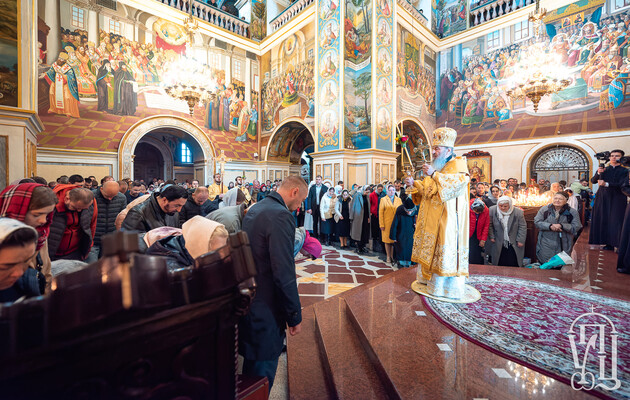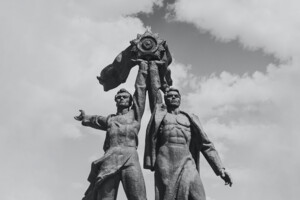«Russian World» on Fire but Doesn’t Get Burnt

article by Kateryna Shchotkina,
Expert, journalist, writer, author of the books "Chronicles of the Tomos", "Lubomyr Husar. I want to be a man"
The very first shots of Russia’s full-scale invasion of Ukraine were supposed to hit at least one target – the doctrine of “Russian world” in Ukraine, together with its bearers and promoters. In particular, in the first weeks of the war, it seemed that the Ukrainian Orthodox Church of the Moscow Patriarchate (hereinafter – the UOC MP) was living out its last days in Ukraine. The greatest romantics expected the “awakening” of the souls and conscience of the clergy of the UOC MP itself. Someone expected a mass transfer of parishes from the UOC MP to the Orthodox Church of Ukraine (hereinafter – the OCU). Someone was hoping for the authorities to stop the activities of the church branch of the “Russian world” in Ukraine, just as it blocked the broadcasting of some TV channels. Freedom of conscience is no more or less valuable than freedom of speech.
It would be a lie to say that nothing of the expected events has happened. However, nothing at least a little matching the expectations and, more importantly, the scale of the disaster we are experiencing, has happened. After half a year of war, the church revision in Ukraine never took place. And there is every reason to believe that it is not even foreseen.
Chronicles of the dive church
The war, that began eight years ago, continues to destroy the UOC MP both physically and mentally, sparing neither property, nor reputation and human lives. Devotion to the imperial idea of “the unity of Holy Rus” against the background of the national liberation war puts this church in an extremely uncomfortable position. Its superiors, namely Patriarch Kirill of Moscow, blesses his compatriots to kill Ukrainians. Many collaborators are recorded among the clergy of the UOC MP in the occupied territories (and in other locations). Not only among priests and ordinary monks, but also among bishops and archbishops.

This, of course, surprises noone as since 2014, everyone has almost got used to it. However, against the background of large-scale military operations, all these facts and events are perceived especially acutely and require explanations which bother noone in the UOC MP.
However, does reputation matter here? The UOC MP is experiencing much more tangible, alarming and tragic losses. The “Russian world” with its evil appetite devours itself first of all since the fire of war burns mainly in the regions where the Moscow Patriarchate traditionally had the greatest influence. These quantitative losses are especially painful for the UOC MP, because the number (of parishes and believers) has always been the main trump card of this church in its disputes both with the authorities and with competitors. Now many parishes have been destroyed. Many believers have left their places, moved to other regions, and fled the country.
The part that ended up under occupation is also slipping out of the hands of the UOC MP because the Moscow Patriarchate quite frankly declares that there is no need for the UOC MP in the so-called new subjects of the federation (that is, on stolen Ukrainian lands) as the Russian Orthodox Church should operate there. Moreover, judging by the documents of the patriarchal office, many priests of the UOC MP will not be able to simply “change their employer” and return to/remain in their parishes in the event of their joining the Russian Orthodox Church, because “it is impossible to obtain evidence of their ordination.” The Russian Orthodox Church will appoint its priests to their parishes. It is pretty obvious though as, firstly, wealthy (traditionally well off) Ukrainian parishes are a tidbit, and secondly, following customs of the empire, “Varangians” are sent to the conquered lands.
To sum it up, the situation is absurd as those who faithfully and truthfully worked for the “Russian world,” talked about the “persecution of the canonical church,” etc., can now only count on the mythical “persecutors” winning back and returning to the rightful owners what was stolen by the “liberators.”
On the bottom
In the context of these losses, the transition of parishes from the UOC MP to the OCU seems to be few and episodic. The relatively small number of transitions may be surprising, but there are reasons for reluctance to change something in one’s spiritual life, which I will not dwell on now. I will only say that the leadership of the UOC MP, for its part, took measures designed to protect the church from a mass exodus of believers to the “competing company.”
Let me remind you that at the beginning of the war, a revolt against Moscow was brewing in the ranks of the UOC MP priesthood, and it seemed that the “transitions” were about to break the dam and pour out in an endless stream. But the situation was defused by the UOC MP Cathedral, which allowed the priests not to commemorate Patriarch Kirill and generally hid the Moscow registration of this church deeper under cover. At that time, the mass media in unison – suspiciously in unison, and for some reason almost in the same wording – trumpeted the “victory,” namely the alleged severance of ties between the Russian Orthodox Church and the UOC MP by the latter, which at the same time became fully independent.
It partly worked for the priests stopped wandering, the voices of the speakers of the UOC MP became stronger. Work began on strengthening the image of the church, which had been shaken. For instance, “humane stories” about heroic priests of the UOC MP serving in degrading conditions, volunteer believers risking their lives in the name of their neighbors, saving walls of monasteries, as well as care for wounded souls on the front line, in evacuation, and abroad. The main message of these stories is not quite the personal feat of specific people but the narrative that “the church is with the people” and “the UOC is not a Moscow church, but a real Ukrainian church.”
Naturally, no one is over-accentuating evidence of collaboration, particularly in the episcopate. Both official spokesmen and clerical leaders of public opinion try to “overlook” them.
The activity of “unofficial” church speakers is on the rise, making the absence of at least some official comments, explanations and positions of the church all the more glaring. Even if one of the “princes of the church” is caught in the spotlight, everything is somehow malapropos. Metropolitan Onufrii, for instance, was seen bidding welcome to Russian prisoners like a good uncle to his nephews. Metropolitan Pavlo Lebid, for his part, took across the border a consignment of consumer goods from the church store. Another example is Metropolitan Panteleimon of Alchevsk, who could be unmistakably recognized by his white miter in the crowd at Putin’s celebration of the annexation of Ukrainian territories… The episcopate of the Ukrainian Orthodox Church (Moscow Patriarchate) seems to be waiting for “better days.” What days are “better” in their opinion is anybody’s guess.
The head deacon of this church, Vadym Novinskyi, is also keeping a low profile. Judging from the ripples on the carpets of high offices, however, one might say that the main sponsor and lobbyist of the UOC-MP, albeit lying low together with his clergy, has not retired.
Good orthodox Russians
Well, you can afford to lie at the bottom when there is an energetic ally ready to help you out of an awkward position. For the UOC MP, the Ukrainian government turned out to be such an ally. This may be a surprise, but trust me as a person who has been observing church politics in Ukraine for a long time – there is nothing surprising. This had to be expected.
The readiness of the authorities to pick up the plummeting reputation of the UOC MP was revealed immediately after the Council, at which the UOC MP allegedly “broke up” with Moscow. The authorities instantly backed the UOC MP, and the sheer speed of this gesture revealed them. The premises in which the Council was held had not yet cooled down, its documents had not yet been published, and the State Service for Ethnopolitics and Freedom of Conscience already started promoting to the masses the new image of the UOC – which was “no longer UOC MP.”
When the documents of the Council became available, it turned out that there was no “complete and unconditional break up with Moscow” in the UOC MP. But who bothers with reading documents? Especially when the style of the “new clothing of the high priest” has already been approved at the top level.
Not everything, of course, goes smoothly, the authorities are facing severe hunger for professionals. For example, deputy head of the Security Service of Ukraine for Kyiv and the region Yurii Palagniuk was the victim of unprofessionalism. About a month ago, he signed a document that was supposed to prevent the transition of parishes from the UOC MP to the OCU, because these transitions allegedly pose a threat to the national security of Ukraine. Experts said that Palagniuk was deliberately “framed.” I will not argue with experts. I can say one thing – the document signed by him is complete nonsense.
Interestingly, the same (and all kinds of other) nonsense is regularly voiced by head of State Service for Ethnopolitics and Freedom of Conscience Olena Bohdan. Her nonsense is first-class, tested by time, aged like good wine. Like a schoolgirl, the head of the State Service for Ethnopolitics and Freedom of Conscience repeats verbatim the methods written in the UOC MP (or in the Novinsky Union of Orthodox Journalists, or in Moscow itself) even before the war. For example, she stated that the UOC MP cannot be influenced, because it is “the most numerous confession in Ukraine” and it has “more monks than the OCU.” Let me remind you that there is war in Ukraine, and the hostilities cover the very territory where the UOC MP was the most massive. Currently, it is impossible to calculate how many parishes and believers are left in this church (and not only in it), whether it is still the “the most numerous.” It is inconvenient to even remind the person who is “in charge of religion” in our country of the fact that monasticism is not about quantity, but about quality. The quality of the monks of the Kyiv-Pechersk Lavra, whom Ms Bohdan particularly fiercely “vouches for,” fully embodies the bright image of abbot of the monastery, Metropolitan Pavlo Lebid. Admire him and remember – there are many of them. On top of that, they regularly pay utility bills (another excellent argument in favor of the UOC MP from the head of the State Service for Ethnopolitics and Freedom of Conscience).
I can say one thing to defend Olena Bohdan – the stream of manipulations she’s been voicing almost certainly does not reflect her personal sympathies. She is only an official in the structure of the Ministry of Culture, who is responsible for a direction in which she is poorly versed. It’s a common thing, that incompetence of an official is a convenient way to keep the entire industry under manual control.
There is no doubt about one thing, the authorities are interested in preserving the UOC MP and rehabilitating its image. And it’s not just about individuals in the president’s office who have business interests or personal sympathies in the church. The president himself is interested in a “good UOC without MP.”
Of course, he partially healed the injury caused by tomos. However, it is one thing to fool around on stage, and another is to be president, especially in a country at war. Volodymyr Zelenskyi’s relations with the OCU have more or less normalized. Meanwhile, the coldness and mistrust probably haven’t gone anywhere. The president’s advisers, as the man himself, understand very well that they are unlikely to be able to conclude a stable political alliance with the OCU. And not only since this church owes Zelenskyi’s main political competitor, but also because for the majority of those who support the OCU, current president has never been “their mate” and is unlikely to become one.
Instead, the UOC MP can play for the current president the same role that it played for many of his predecessors, the role of a counterweight to the OCU. Of course, without the fundamental depth of Patriarch Filaret, the “national church” lost a lot of weight. But against the background of the national liberation war, its authority grows and strengthens. And that’s why it would be good to have some kind of counterargument in hand. Nothing special, I should reiterate that throughout the modern history of Ukraine, church division was actively used in political struggle. And if the tool works, why break it?
The authorities are interested in keeping the white image of the UOC MP, because they expect to use it in the following political battles. And therefore, the low quality manuals which State Service for Ethnopolitics and Freedom of Conscience is currently following will sooner or later be corrected and rewritten. Together we will hear many human stories about how priests and believers of the UOC MP showed heroism in defending their country, and about what terrible losses this church suffered during military operations and during the occupation. Many of these will be true. However, this truth will be used for very specific political purposes. We will still hear that “the church heals souls” (although we know very well that it successfully poisons them). We will be told that the church unites (although the recent history of the Ukrainian Orthodox Church is a direct denial of this point). We will hear that the church channels help return our deported or captured compatriots. In general, we will see many arguments in favor of the fact that Ukraine needs to preserve the UOC (since “they are no longer MP!”).
We will never hear a word about what role this church structure played in the preparation of this war. I can assume that this issue will become as “provocative” or even “harmful” as the issue of unpreparedness for war, demined Chongar and other “shashlykys” (In January 2022, the president asked the population not to panic and to critically assess information about a possible Russian invasion of Ukraine telling his compatriots to get ready for the traditional spring barbeques, called “shashlyky”). As you can see, our government and the UOC MP have many common problems. So why don’t they help each other?
Read this article by Kateryna Shchotkina in russian and Ukrainian at the links.
Please select it with the mouse and press Ctrl+Enter or Submit a bug












 Login with Google
Login with Google